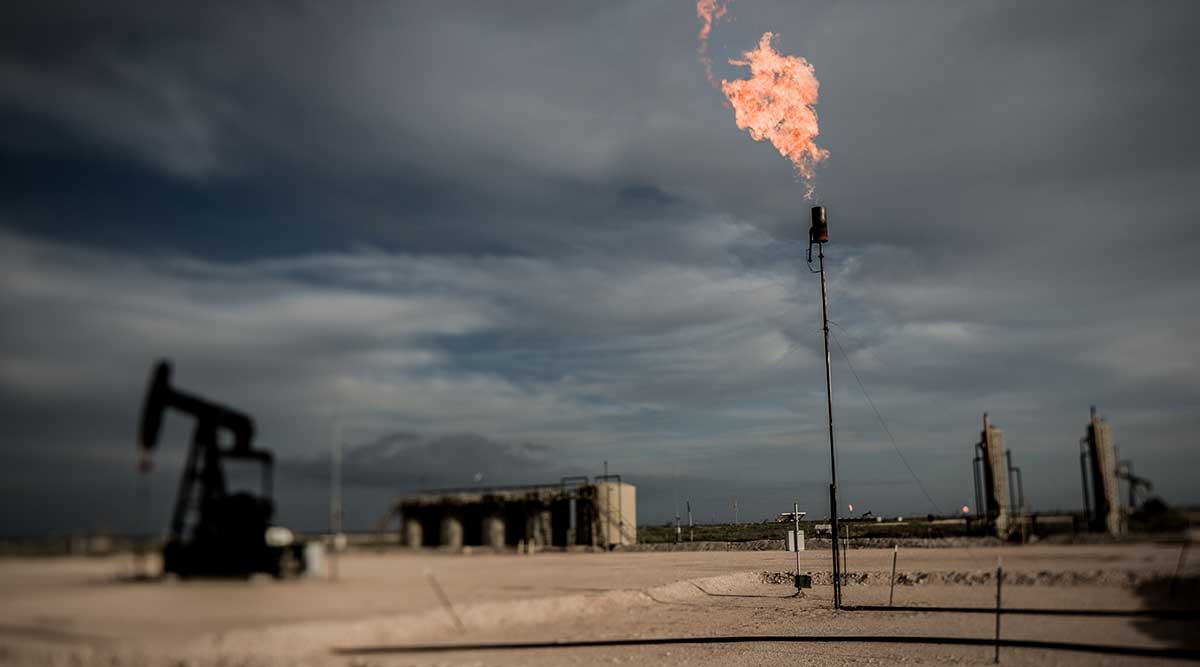Crude Oil Rises to 5-Month High as US Output Slips

Oil climbed to the highest level in almost five months after a government report showed U.S. crude production fell and Iraq said talks to freeze output will be revived.
Futures rose 3.8% in New York. Crude output fell to 8.95 million barrels a day in the week ended April 15, the lowest since October 2014, Energy Information Administration data show.
Rigs targeting oil in the United States slipped to the least since November 2009 last week. OPEC members and other producers plan to meet in Russia, possibly in May, in a push to cap crude output and support prices, Iraq’s Deputy Oil Minister Fayyad Al-Nima said.
"The drop in the rig count is starting to have a big impact on production," said Joe Bozoyan, an equity portfolio manager who focuses on energy at John Hancock in Boston. "Production is already down 600,000 barrels from its peak last year and is going to go lower. The rebalancing of the market is starting to happen."
Prices fell April 18 after talks in Doha, Qatar, the prior day among the world’s largest producers about capping output failed. Saudi Arabia said it wouldn’t restrain output without commitments from all Organization of Petroleum Exporting Countries members, including Iran, which has ruled out freezing for now. Declines were limited because of a strike by oil workers in Kuwait.
West Texas Intermediate for May delivery, which expired April 20, rose $1.55 to close at $42.63 a barrel on the New York Mercantile Exchange. It was the highest settlement since Nov. 25. The more-active June WTI contract climbed $1.71 to $44.18 a barrel.
Brent crude for June settlement advanced $1.77, or 4%, to $45.80 a barrel. It was the highest close since Nov. 25. The global benchmark ended the session at a $1.62 premium to June WTI.
The Standard & Poor’s 500 Index climbed to the highest level in more than five months, bolstering optimism about demand. Equities in Europe ended at session highs after reversing losses. The S&P 500 Oil & Gas Exploration and Production Index climbed to the highest since Dec. 3.
"We’ve had a tight correlation with the equity markets the last couple days," said Stephen Schork, president of the Schork Group Inc., a consulting company in Villanova, Pennsylvania. "The bulls have control of the market and will use any headline to move higher."
The Bloomberg Commodity Index, a gauge of 22 raw materials, increased as much as 1.9% to the highest level since Nov. 11.
Iraq sees prices rising slowly despite the failure of the Doha meeting, said Al-Nima, who assumed the duties of oil minister after Adel Abdul Mahdi suspended his participation in the cabinet last month. There still is no agreement on an oil meeting in May, Russian Energy Minister Alexander Novak said after Al-Nima’s comment.
"Revived hope about the big freeze has covering traders their shorts," said Phil Flynn, a senior market analyst at Price Futures Group in Chicago.
Russia doubts that there will be a production freeze in the foreseeable future, Novak said in an interview in Moscow. After the discussions in Doha, the chances for a deal are "relatively low," he said.
Crude inventories climbed 2.08 million barrels to 538.6 million barrels last week, the highest level since 1930, the EIA data show. Supplies at Cushing, Oklahoma, the delivery point for WTI and the nation’s biggest oil-storage hub, dropped by 248,000 barrels.
Refineries bolstered operating rates by 0.2 percentage point to 89.4% of capacity. U.S. refiners typically increase utilization in April as they finish maintenance before the summer peak driving season.
Diesel futures led gains. Supplies of distillate fuel, a category that includes diesel and heating oil, tumbled 3.55 million barrels, the biggest decline in three months. Gasoline stockpiles slipped 110,000 barrels.
May diesel futures climbed 5.5% to $1.3322 a gallon, the highest settlement since Dec. 4. Gasoline for May delivery rose 1.8% to $1.5068.
Crude prices fell as much as 3% early in the session as Kuwait said oil workers were returning to work after a three-day strike that disrupted output. Workers will resume their jobs April 20 out of respect for the country’s emir after showing the importance of their role in the economy, KUNA, the country’s official news agency said, citing a labor union statement.
Other oil-market news:
• Russia’s oil shipments may rise in the absence of a plan to coordinate output with OPEC members. Daily production may increase by 100,000 barrels to 10.81 million in 2016, according to Deputy Energy Minister Kirill Molodtsov.
• Oil prices will touch new lows within a month after the failure of talks in Doha, according to Venezuelan Energy Minister Eulogio del Pino.


